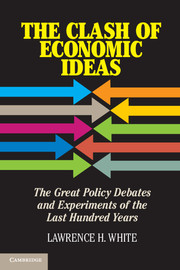Book contents
- Frontmatter
- Contents
- Figures
- Acknowledgments
- Introduction
- 1 The Turn Away from Laissez-Faire
- 2 The Bolshevik Revolution and the Socialist Calculation Debate
- 3 The Roaring Twenties and Austrian Business Cycle Theory
- 4 The New Deal and Institutionalist Economics
- 5 The Great Depression and Keynes’s General Theory
- 6 The Second World War and Hayek’s Road to Serfdom
- 7 Postwar British Socialism and the Fabian Society
- 8 The Mont Pelerin Society and the Rebirth of Smithian Economics
- 9 The Postwar German “Wonder Economy” and Ordoliberalism
- 10 Indian Planning and Development Economics
- 11 Bretton Woods and International Monetary Thought
- 12 The Great Inflation and Monetarism
- 13 The Growth of Government
- 14 Free Trade, Protectionism, and Trade Deficits
- 15 From Pleasant Deficit Spending to Unpleasant Sovereign Debt Crisis
- Index
- References
12 - The Great Inflation and Monetarism
Published online by Cambridge University Press: 05 June 2012
- Frontmatter
- Contents
- Figures
- Acknowledgments
- Introduction
- 1 The Turn Away from Laissez-Faire
- 2 The Bolshevik Revolution and the Socialist Calculation Debate
- 3 The Roaring Twenties and Austrian Business Cycle Theory
- 4 The New Deal and Institutionalist Economics
- 5 The Great Depression and Keynes’s General Theory
- 6 The Second World War and Hayek’s Road to Serfdom
- 7 Postwar British Socialism and the Fabian Society
- 8 The Mont Pelerin Society and the Rebirth of Smithian Economics
- 9 The Postwar German “Wonder Economy” and Ordoliberalism
- 10 Indian Planning and Development Economics
- 11 Bretton Woods and International Monetary Thought
- 12 The Great Inflation and Monetarism
- 13 The Growth of Government
- 14 Free Trade, Protectionism, and Trade Deficits
- 15 From Pleasant Deficit Spending to Unpleasant Sovereign Debt Crisis
- Index
- References
Summary
In his Newsweek column of 2 February 1970, Milton Friedman enthusiastically applauded the previous week’s appointment of Arthur Burns, his former college professor and mentor, as chairman of the Board of Governors of the Federal Reserve System. He lauded Burns as “the first person ever named Chairman of the Board who has the right qualifications for that post.” Under Burns’s predecessor the U.S. inflation rate had reached 5.5 percent in 1969, having averaged less than 1.5 percent between 1952 and 1965. Friedman’s research had convinced him that inflation – persistently rising money prices of goods on average – was due to overly rapid growth in the stock of money, more and more dollars chasing each bundle of goods. As head of the central bank, Burns would be in a position to control the quantity of money in the American economy. Friedman encouraged Burns to produce growth in the money stock “low enough to avoid renewed inflation.”
In only a few months Friedman had to choose between continuing to express his views honestly and keeping his friendship with Burns unimpaired. As Fed chairman Burns began making public statements attributing inflation not to previous monetary policy, but to “cost-push” factors beyond the central bank’s control. In July 1971 Burns told a congressional hearing: “The rules of economics are not working in quite the way they used to. Despite extensive unemployment in our country, wage rate increases have not moderated. Despite much idle industrial capacity, commodity prices continue to rise rapidly.” He called for federal wage and price controls to fight this supposedly new type of inflation – a policy response that in Friedman’s view was akin to fighting a fever by breaking the thermometer.
- Type
- Chapter
- Information
- The Clash of Economic IdeasThe Great Policy Debates and Experiments of the Last Hundred Years, pp. 306 - 331Publisher: Cambridge University PressPrint publication year: 2012



